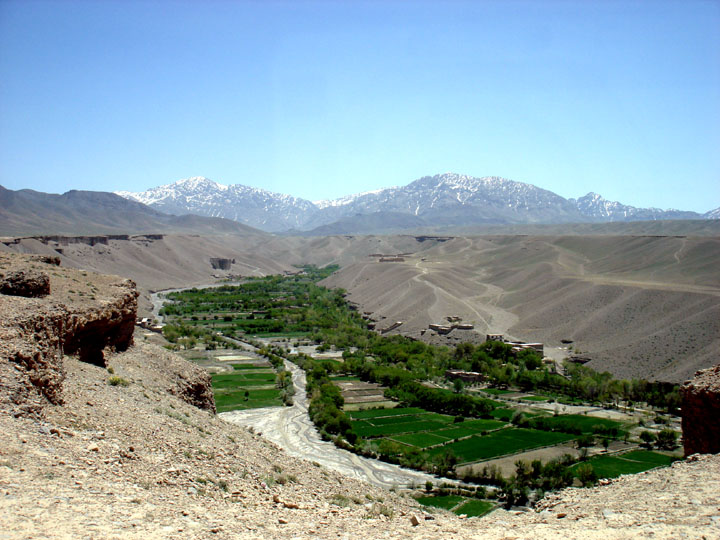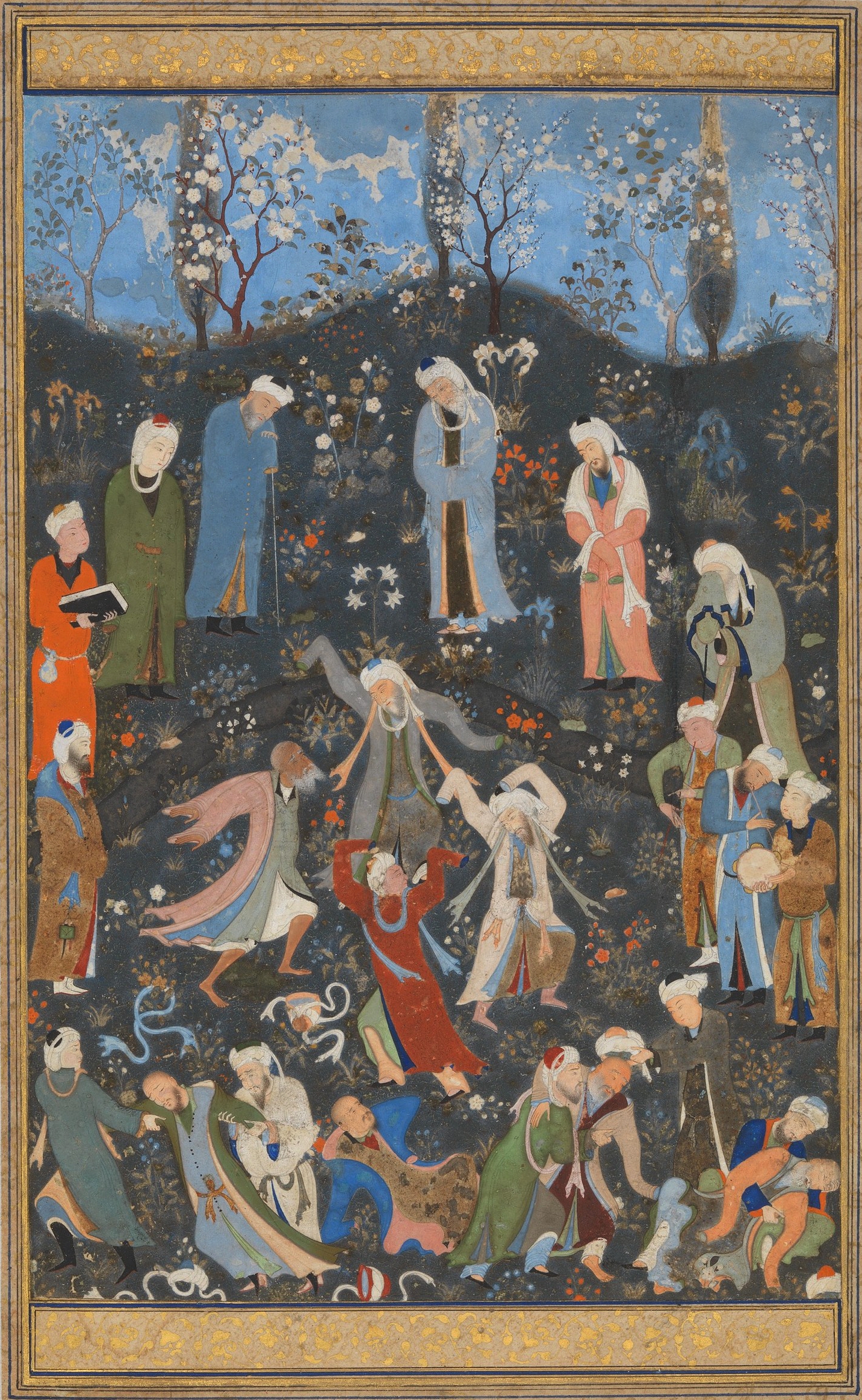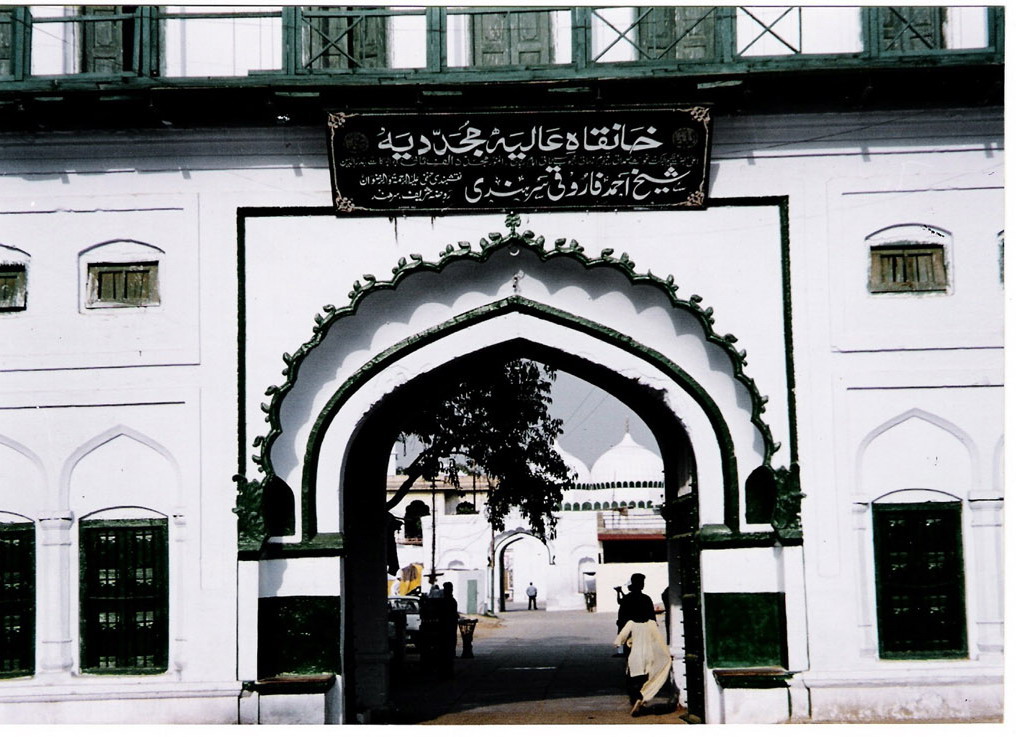|
Yaqub Al-Charkhi
Yaqub al Charkhi ( Persian یعقوب الچرخی) was a Naqshbandi Sheykh and student of Khwaja Sayyid Alauddin Atar. Yaqub Charkhi was born in 762, in a village called Charkh in Logar, Afghanistan AH and died in 851. He was a Sufi master and also a reputed Islamic scholar. His full name was Yaqūb bin Usmān bin Mahmūd. He was born around 762 AH (1360/61) and died on Saturday 5 Safar 851 AH (22 April 1447). His shrine, according to some research scholars, lies 5 kilometres West of Dushanbe the capital of Tajikistan. Yaqub al-Charkhi was teacher of famous Sufi Khwaja Ahrar Nassiruddin Ubaidullah Ahrar (1404-1490 AD) (in Persian: ناصرالدین عبیدالله احرار) more popularly known as Khwaja Ahrar (in Persian: خواجه احرار) was a Hanafi Maturidi member of the Golden Chain of the Naqshba ... References Naqshbandi order Sufi religious leaders Sufis Founders of Sufi orders Sufi saints Hanafis Maturidis 1360 births 1447 deaths ... [...More Info...] [...Related Items...] OR: [Wikipedia] [Google] [Baidu] |
Logar Province
Logar (Pashto/Dari: ; meaning Greater Mountain ( لوې غر)) is one of the 34 provinces of Afghanistan located in the eastern section of the country. It is divided into 7 districts and contains hundreds of villages. Puli Alam is the capital of the province. As of 2021, Logar has a population of approximately 442,037. It is a multi-ethnic tribal society, while about 65% of its residents are made up by Pashtuns whereas the remainder are Tajiks and Hazaras. The Logar River enters the province through the west and leaves to the north. History Pre Islamic era A 2,600-year-old a Zoroastrian fire temple was found at Mes Aynak (about 25 miles or 40 kilometers southeast of Kabul). Several Buddhist stupas and more than 1,000 statues were also found. Smelting workshops, miners’ quarters (even then the site's copper was well known), a mint, two small forts, a citadel, and a stockpile of Kushan, Sassanian and Indo-Parthian coins were also found at the site. Recent hist ... [...More Info...] [...Related Items...] OR: [Wikipedia] [Google] [Baidu] |
Naqshbandi Order
The Naqshbandi ( fa, نقشبندی)), Neqshebendi ( ku, نهقشهبهندی), and Nakşibendi (in Turkish) is a major Sunni order of Sufism. Its name is derived from Baha-ud-Din Naqshband Bukhari. Naqshbandi masters trace their lineage to the Islamic prophet Muhammad through Abu Bakr, the first Caliph of Sunni Islam and Ali, the fourth Caliph of Sunni Islam. It is because of this dual lineage through Ali and Abu Bakr through the 6th Imam Jafar al Sadiq that the order is also known as the "convergence of the two oceans" or "Sufi Order of Jafar al Sadiq". History The Naqshbandi order owes many insights to Yusuf Hamdani and Abdul Khaliq Gajadwani in the 12th century, the latter of whom is regarded as the organizer of the practices and is responsible for placing stress upon the purely silent ''invocation''. It was later associated with Baha-ud-Din Naqshband Bukhari in the 14th century, hence the name of the order. The name can be interpreted as "engraver (of ... [...More Info...] [...Related Items...] OR: [Wikipedia] [Google] [Baidu] |
Maturidis
Māturīdī theology or Māturīdism ( ar, الماتريدية: ''al-Māturīdiyyah'') is one of the main Sunnī schools of Islamic theology, founded by the Persian Muslim scholar, Ḥanafī jurist, reformer (''Mujaddid''), and scholastic theologian Abū Manṣūr al-Māturīdī in the 9th–10th century. Al-Māturīdī codified and systematized the theological beliefs already present among the Ḥanafite Muslim theologians of Balkh and Transoxania under one school of systematic theology ('' kalām''); he emphasized the use of rationality and theological rationalism regarding the interpretation of the sacred scriptures of Islam. Māturīdī theology is considered one of the orthodox creeds of Sunnī Islam alongside the Aṯharī and Ashʿarī, and prevails in the Ḥanafī school of Islamic jurisprudence. Māturīdism was originally circumscribed to the region of Transoxania in Central Asia but it became the predominant theological orientation amongst the Sunnī Musli ... [...More Info...] [...Related Items...] OR: [Wikipedia] [Google] [Baidu] |
Hanafis
The Hanafi school ( ar, حَنَفِية, translit=Ḥanafiyah; also called Hanafite in English), Hanafism, or the Hanafi fiqh, is the oldest and one of the four traditional major Sunni schools ( maddhab) of Islamic Law (Fiqh). It is named after the 8th century Kufan scholar, Abu Hanifa, a Tabi‘i of Persian origin whose legal views were preserved primarily by his two most important disciples, Imam Abu Yusuf and Muhammad al-Shaybani. It is considered one of the most widely accepted maddhab amongst Sunni Muslim community and is called the ''Madhhab of Jurists'' (maddhab ahl al-ray). The importance of this maddhab lies in the fact that it is not just a collection of rulings or sayings of Imam Abu Hanifa alone, but rather the rulings and sayings of the council of judges he established belong to it. It had a great excellence and advantage over the establishment of Sunni Islamic legal science. No one before Abu Hanifa preceded in such works. He was the first to solve the cas ... [...More Info...] [...Related Items...] OR: [Wikipedia] [Google] [Baidu] |
Sufi Saints
Sufi saints or Wali ( ar, ولي, plural ʾawliyāʾ أولياء) played an instrumental role in spreading Islam throughout the world. In the traditional Islamic view, a saint is portrayed as someone "marked by pecialdivine favor ... ndholiness", and who is specifically "chosen by God and endowed with exceptional gifts, such as the ability to work miracles."Radtke, B., "Saint", in: ''Encyclopaedia of the Qurʾān'', General Editor: Jane Dammen McAuliffe, Georgetown University, Washington, D.C.. List A B * Baba Fakruddin (1169–1295, buried in Penukonda) * Baba Kuhi of Shiraz (948-1037) * Baba Shadi Shaheed (17th century, first Chib Rajput to convert to Islam, married a daughter of Babur) * Sheikh Bedreddin (1359–1420, buried in Istanbul in 1961, revolted against Mehmed I) * Baha' al-Din Naqshband (1318–1389, buried in Bukhara, founder of the Naqshbandi order) * Balım Sultan (d. 1517/1519, buried in Nevşehir Province, co-founder of the Bektashi Order ... [...More Info...] [...Related Items...] OR: [Wikipedia] [Google] [Baidu] |
Founders Of Sufi Orders
Founder or Founders may refer to: Places * Founders Park, a stadium in South Carolina, formerly known as Carolina Stadium * Founders Park, a waterside park in Islamorada, Florida Arts, entertainment, and media * Founders (''Star Trek''), the alien leaders of the fictional state and military superpower, the Dominion, in ''Star Trek'' * ''The Founder'' (newspaper), the student newspaper at Royal Holloway, University of London * '' The Founder'', a 2016 biographical feature film about McDonald's pioneer Ray Kroc Companies and organizations * Founder Group, a Chinese information technology and pharmaceutical conglomerate ** Founder Technology, a Shanghai subsidiary * Founders Brewing Company, a craft brewery located in Grand Rapids, Michigan, United States * Founders Ministries, Christian group in the United States * Worshipful Company of Founders, a livery company based in London, England, United Kingdom Roles * Organizational founder, the person or group of persons respons ... [...More Info...] [...Related Items...] OR: [Wikipedia] [Google] [Baidu] |
Sufis
Sufism ( ar, ''aṣ-ṣūfiyya''), also known as Tasawwuf ( ''at-taṣawwuf''), is a mystic body of religious practice, found mainly within Sunni Islam but also within Shia Islam, which is characterized by a focus on Islamic spirituality, ritualism, asceticism and esotericism. It has been variously defined as "Islamic mysticism",Martin Lings, ''What is Sufism?'' (Lahore: Suhail Academy, 2005; first imp. 1983, second imp. 1999), p.15 "the mystical expression of Islamic faith", "the inward dimension of Islam", "the phenomenon of mysticism within Islam", the "main manifestation and the most important and central crystallization" of mystical practice in Islam, and "the interiorization and intensification of Islamic faith and practice". Practitioners of Sufism are referred to as "Sufis" (from , ), and historically typically belonged to "orders" known as (pl. ) – congregations formed around a grand who would be the last in a chain of successive teachers linking back to Muha ... [...More Info...] [...Related Items...] OR: [Wikipedia] [Google] [Baidu] |
Sufi Religious Leaders
Sufism ( ar, ''aṣ-ṣūfiyya''), also known as Tasawwuf ( ''at-taṣawwuf''), is a mystic body of religious practice, found mainly within Sunni Islam but also within Shia Islam, which is characterized by a focus on Islamic spirituality, ritualism, asceticism and esotericism. It has been variously defined as "Islamic mysticism",Martin Lings, ''What is Sufism?'' (Lahore: Suhail Academy, 2005; first imp. 1983, second imp. 1999), p.15 "the mystical expression of Islamic faith", "the inward dimension of Islam", "the phenomenon of mysticism within Islam", the "main manifestation and the most important and central crystallization" of mystical practice in Islam, and "the interiorization and intensification of Islamic faith and practice". Practitioners of Sufism are referred to as "Sufis" (from , ), and historically typically belonged to "orders" known as (pl. ) – congregations formed around a grand who would be the last in a chain of successive teachers linking back to M ... [...More Info...] [...Related Items...] OR: [Wikipedia] [Google] [Baidu] |
Sheykh
Sheikh (pronounced or ; ar, شيخ ' , mostly pronounced , plural ' )—also transliterated sheekh, sheyikh, shaykh, shayk, shekh, shaik and Shaikh, shak—is an honorific title in the Arabic language. It commonly designates a chief of a tribe or a royal family member in Arabian countries, in some countries it is also given to those of great knowledge in religious affairs as a surname by a prestige religious leader from a chain of Sufi scholars. It is also commonly used to refer to a Muslim religious scholar. It is also used as an honorary title by people claiming to be descended from Hasan ibn Ali and Husayn ibn Ali both patrilineal and matrilineal who are grandsons of the Islamic prophet Muhammad. The term is literally translated to " Elder" (is also translated to "Lord/ Master" in a monarchical context). The word 'sheikh' is mentioned in the 23rd verse of Surah Al-Qasas in the Quran. Etymology and meaning The word in Arabic stems from a triliteral root connected wit ... [...More Info...] [...Related Items...] OR: [Wikipedia] [Google] [Baidu] |
Afghanistan
Afghanistan, officially the Islamic Emirate of Afghanistan,; prs, امارت اسلامی افغانستان is a landlocked country located at the crossroads of Central Asia and South Asia. Referred to as the Heart of Asia, it is bordered by Pakistan to the east and south, Iran to the west, Turkmenistan to the northwest, Uzbekistan to the north, Tajikistan to the northeast, and China to the northeast and east. Occupying of land, the country is predominantly mountainous with plains in the north and the southwest, which are separated by the Hindu Kush mountain range. , its population is 40.2 million (officially estimated to be 32.9 million), composed mostly of ethnic Pashtuns, Tajiks, Hazaras, and Uzbeks. Kabul is the country's largest city and serves as its capital. Human habitation in Afghanistan dates back to the Middle Paleolithic era, and the country's Geostrategy, strategic location along the historic Silk Road has led it to being described, pict ... [...More Info...] [...Related Items...] OR: [Wikipedia] [Google] [Baidu] |
Naqshbandi
The Naqshbandi ( fa, نقشبندی)), Neqshebendi ( ku, نهقشهبهندی), and Nakşibendi (in Turkish) is a major Sunni order of Sufism. Its name is derived from Baha-ud-Din Naqshband Bukhari. Naqshbandi masters trace their lineage to the Islamic prophet Muhammad through Abu Bakr, the first Caliph of Sunni Islam and Ali, the fourth Caliph of Sunni Islam. It is because of this dual lineage through Ali and Abu Bakr through the 6th Imam Jafar al Sadiq that the order is also known as the "convergence of the two oceans" or "Sufi Order of Jafar al Sadiq". History The Naqshbandi order owes many insights to Yusuf Hamdani and Abdul Khaliq Gajadwani in the 12th century, the latter of whom is regarded as the organizer of the practices and is responsible for placing stress upon the purely silent ''invocation''. It was later associated with Baha-ud-Din Naqshband Bukhari in the 14th century, hence the name of the order. The name can be interpreted as "engraver (of ... [...More Info...] [...Related Items...] OR: [Wikipedia] [Google] [Baidu] |
Persian Language
Persian (), also known by its endonym and exonym, endonym Farsi (, ', ), is a Western Iranian languages, Western Iranian language belonging to the Iranian languages, Iranian branch of the Indo-Iranian languages, Indo-Iranian subdivision of the Indo-European languages. Persian is a pluricentric language predominantly spoken and used officially within Iran, Afghanistan, and Tajikistan in three mutual intelligibility, mutually intelligible standard language, standard varieties, namely Iranian Persian (officially known as ''Persian''), Dari, Dari Persian (officially known as ''Dari'' since 1964) and Tajik language, Tajiki Persian (officially known as ''Tajik'' since 1999).Siddikzoda, S. "Tajik Language: Farsi or not Farsi?" in ''Media Insight Central Asia #27'', August 2002. It is also spoken natively in the Tajik variety by a significant population within Uzbekistan, as well as within other regions with a Persianate society, Persianate history in the cultural sphere of Greater Ira ... [...More Info...] [...Related Items...] OR: [Wikipedia] [Google] [Baidu] |








